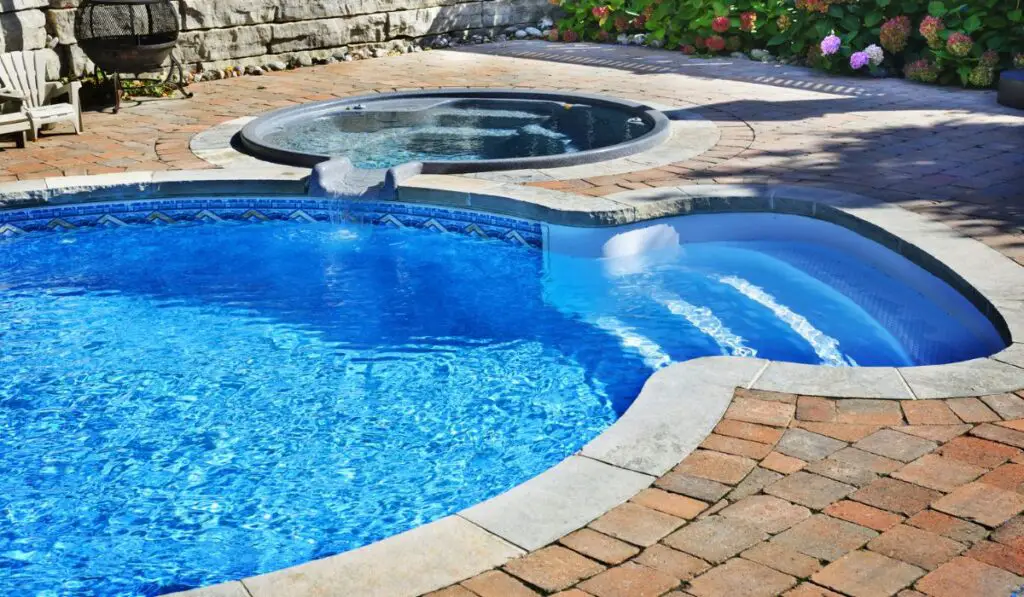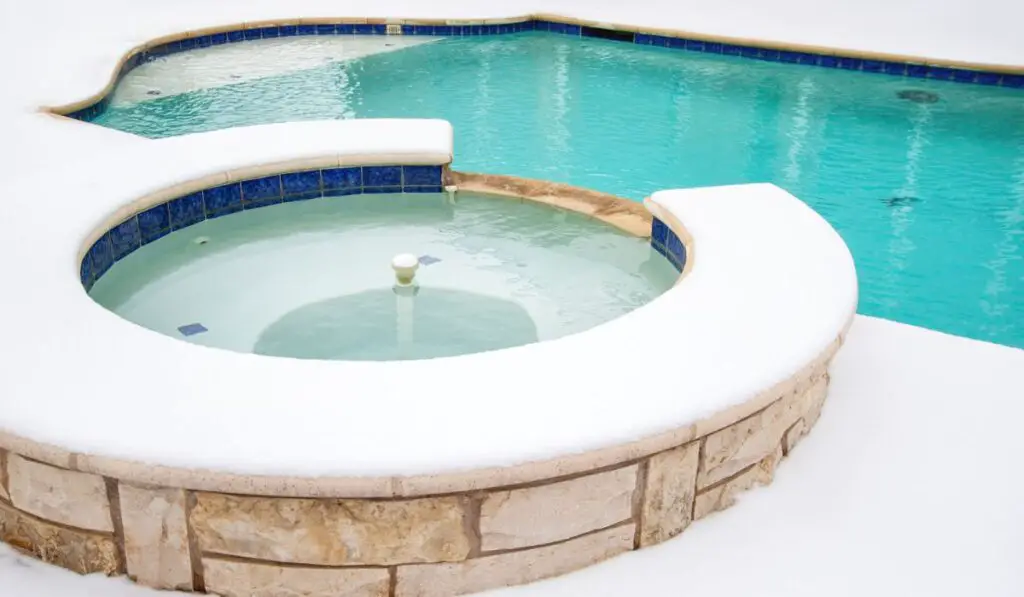If you have the budget and want to add a little more luxury to your existing pool, you might be thinking about adding a hot tub. This would make a great addition to any pool and is something the whole family can enjoy. However, is it possible to add a hot tub? And how much will it cost?
Yes, you can add a hot tub to an existing pool, creating what’s known as a spillover spa. You should be prepared to pay between $6,500 and $10,000 for the addition, depending on the size of the hot tub you want.
Let’s take a closer look at the option of adding a hot tub to an existing pool, including the benefits of doing so, the maintenance required to run one, and the cost of the installation. That way, you make a decision with confidence.
Can You Build a Hot Tub in a Pool?

Yes, you can! Although you can’t build a hot tub in an above-ground pool, you can certainly do so in an inground pool. It’s become quite a popular upgrade, and is often known as a spillover spa.
The spillover spa is a luxury add-on that can cost quite a lot, but it’s perfectly possible to do if you have the budget.
How Does a Spillover Spa Work?
A spillover spa is simply a hot tub in the pool that’s connected by a curtain of water and a few ledges. The idea is that the water spills over from the hot tub into the pool. There are different ways to go about this.
You could give the hot tub an infinity illusion (just like infinity pools) or you could have a few ledges for the water to travel over. There are many customization options, and a professional will be able to advise you on just what you can do with your pool.
How Do You Heat a Hot Tub in a Pool?
One of the major benefits of a hot tub is, of course, the heat. So just how do you go about achieving this when it’s part of a bigger (and colder) pool?
It can be a little tricky. You need to have a separate heating circulation system as, chances are, you don’t want to heat your pool and hot tub to the same temperature.
It would be extremely expensive to heat your pool to the typical temperature of a hot tub — and it would pretty much ruin the point of a hot tub to have it be the same temperature as the pool water.
A dual-speed pump is best for a hot tub; one pump will fuel the jets and the other will pump heat into the water.
How Much Does It Cost to Add a Spa to an Existing Inground Pool?
It can be hard to estimate the cost for this add-on, as it fully depends on the kind of spa you want as well as the size. For example, a typical six-foot diameter hot tub may cost around $6,000, whereas one with a higher diameter that’s raised from the pool could cost around $10,000.
To get an accurate price, you’ll need to ask a professional contractor and have them look at your pool and consider the specifics of what you’re hoping for.
Don’t be afraid to shop around — and don’t necessarily settle for the lowest price around. You get what you pay for, and good contractors may be expensive.
A lot of good pool experts will take monthly payments, so you can finance the addition. Just make sure you check out the interest rate.
You should also check if the add-on comes with a warranty, because repairs can be pretty costly too.
Finally, also consider the maintenance costs. Heating water costs a lot, after all. How much it will cost you depends on how often you run the hot tub.
The Benefits of Adding a Hot Tub to Your Pool
When weighing up if it’s worth the cost of adding a hot tub to your pool, you need to consider all of the benefits. Here are some:
It Takes Up Less Space Than Another Hot Tub

If you’ve been thinking about adding a hot tub to your home and already have an inground pool, it means you won’t have to find the space elsewhere for one.
Having a separate hot tub would mean you’d need to find a place for it (and all of the equipment that you need for the water and heating). But having a hot tub as part of the pool means you likely already have the space cleared away.
The fact that the hot tub won’t take up too much room makes it a great option for a luxury add-on.
Quality Time
It’s easy for us to forget to spend quality time with our loved ones, especially with other responsibilities such as school, work, and dependents. But a hot tub provides a dedicated place to relax and hang out, with nothing to do but talk to each other and perhaps have a glass of wine or a snack.
It can really improve relationships between couples and family members, and you’ll get added health and relaxation benefits while you spend time with each other. It’s a great opportunity to reconnect.
Relaxation Space
A hot tub is not just a great space to reconnect with family, but also a great space to relax and reconnect with yourself. If you need a place to go after work and read a book or simply spend time with yourself, there’s no better place to do it than a hot tub.
It’s not quite the same as a pool because you don’t need to expend any energy in a hot tub — and, in fact, you can’t really expend any energy. You’re forced to just sit there and relax. Bliss!
Muscle Relaxation and Pain Relief
There are also some great health benefits to having a hot tub. Muscle relaxation is one of them because the heat will help any stiffness or soreness. It can be even more effective than painkillers. It’s not just muscles it can help with, but bones and joint stiffness too.
Promotes Good Sleep
If you struggle to sleep at night, spending an hour in the hot tub beforehand may help. The heat and steam will get you ready for bed — just avoid your usual electronic screens and make sure not to fall asleep in the hot tub itself!
Burning Calories
The heat of a hot tub can also burn calories, making it perfect for those who are trying to lose weight and stay fit without much effort. It’s not a huge amount, but every little helps, and it can make you feel good about yourself at the end of the day.
Things to Watch Out For
As with any major project, there are a few things to watch out for if you’re adding a hot tub to your pool. Make sure you consider these things to keep yourself and your property safe.
Bacteria
Because of the high temperature in a hot tub, chlorine levels may drop more quickly, giving bacteria more of a chance to form. Make sure you’re keeping the chemical levels of your hot tub at an appropriate level.
Keep checking the levels and, if your hot tub is causing any irritation (especially in those with respiratory issues), take the time to check it thoroughly and get that chemical balance back.
If you’re not quite sure what you’re doing, pay someone else to maintain the spa. Skipping out on it might be tempting, but it could cost you more in the long run — and not just financially.
Avoid Open Injuries
If you ever have an open injury, don’t immerse it in hot tub water. Because of the potential bacteria in the water, it can be dangerous. The germs might get into the open injury and irritate it or, worse, cause an infection.
Risks for Health Issues
There are people with certain health issues that a hot tub isn’t good for. For example, studies have shown that because a hot tub heats your body so much, it can put stress on your heart. If you have heart problems, this isn’t good for you.
Hot tubs are also not recommended for pregnant women, because of the rise in core temperature that occurs. You can’t sweat the heat out in hot tubs, and this can be especially harmful in the first twelve weeks of pregnancy.
Ultimately, a hot tub or spillover spa is a great investment if you have the budget and think you’ll get good use out of it. You can use the hot tub to spend quality time with family or relax by yourself, and it doesn’t take up much space since it’s going right next to your inground pool.
Just make sure you choose good contractors and be mindful of the times when a hot tub shouldn’t’ be used.
